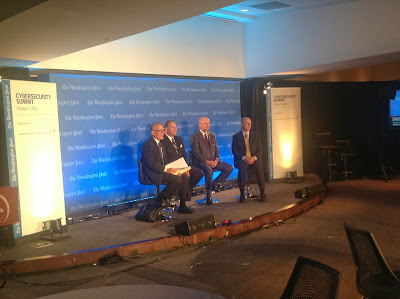(Washington, DC) The National Security Agency (NSA) does not "assassinate" people, House Intelligence Committee Chairman Mike Rogers (R-MI) and former NSA and CIA Director Gen. Michael Hayden said today. Addressing hints from journalists Glenn Greenwald and Jeremy Scahill that they are working on a new bombshell, based on documents obtained by former NSA contractor Edward Snowden, which seemingly implicate NSA in "assassination programs," Rogers said at a Washington Post Cybersecurity Summit today that "to say that the NSA is participating in assassination attempts is completely inaccurate and completely inflammatory."
"I saw Greenwald pushing his equivalent of a movie trailer and I said 'oh this must be interesting because I have no idea what he is talking about,'" Hayden said. "Assassination is a technical term. It is forbidden by executive order. We do do targeted killings against enemy combatants because that is an act of war." Potentially leaving room for interpretation regarding NSA's role in either type of killing, Hayden added "I do hope we make full use of the NSA when we do that."
In terms of Snowden, Rogers said that the revelations flowing from the materials given to Greenwald and others have damaged U.S. security. "It is significant and in many cases irreversible...we have seen many Al Qaeda affiliates change how they do things."
Rogers was skeptical that Snowden could have obtained the extensive set of documents without help, strongly implying that Snowden had the backing of a foreign power, ostensibly China or Russia, two countries to which Snowden fled after leaving the U.S. "I still think there is a lot of unanswered questions here--when you look at the kinds of information he had--there are some things in there that don't quite add up. It sure raises more questions than it answers."
While not going as far as Rogers, Hayden said that Snowden was clearly methodical and calculating in his efforts. "This was a sustained long term campaign that he had undertaken in order to take this information and in fact moved from job to job to facilitate taking this information."
Most governments engage in the kinds of digital intelligence activities that the Snowden documents have exposed but are far less likely to protect civil liberties, Craig Mundie, Senior Advisor to the CEO of Microsoft said. "Virtually every kind of government in the world does the same kind of things [but] they do it with less discretion."
The motivations of the U.S. intelligence apparatus and the reasons other nations engage in digital spying also differ, according to Hayden. "I ran NSA, we steal stuff. We steal things to keep our nation free and our citizens safe. We don't steal things to make people rich," he said.
Whatever the case may be, it's clear that cyberspace is becoming a more dangerous place all around. "In the last twelve months there has been a qualitative change where the threats have become more destructive threats," Microsoft's Mundie said.
And U.S. companies are relatively defenseless. "It's illegal to chase guys up the wire and certainly to shoot back...in the U.S. there is no legal basis for self-defense on the net," Mundie said.
Rogers, however, quickly rebutted the idea that companies such as Microsoft should ever take things into their own hands. "I am very concerned about getting into the notion that we should unleash companies who have the capabilities...because we can't deal with the consequences."

0 comments:
Post a Comment
Note: Only a member of this blog may post a comment.